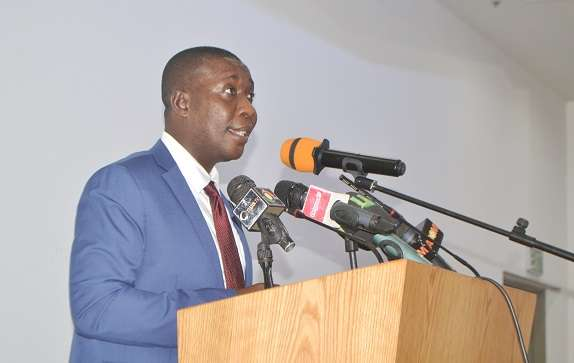As Ghana approaches the 2024 general elections, Professor William Baah-Boateng, Head of the Economics Department at the University of Ghana, has issued a critical call to the government to significantly reduce or manage its fiscal expenditure.
Prof Baah-Boateng iterated that controlling wasteful spending, particularly through procurement, is essential to decreasing the nation’s deficit and avoiding tax increases that could stifle business growth. He thus, highlighted the pressing issue of fiscal management, particularly as the election period nears.
“The elephant in the room is the fiscal side, and my main concern will be the reduction, minimising, or eradication of wastage through procurement. I think if we’re able to reduce all the wastage there, we will not come out to increase taxes which will also kill businesses. Because it’s about expenditure and revenue. We seem to focus more on taxes and then we will kill businesses, while we’re wasting a lot of money on the expenditure side” he said.
The professor’s remarks come at a time when the government’s fiscal policies are under intense scrutiny. The need to balance expenditure and revenue without overburdening the business community is paramount. He argues that addressing the inefficiencies in government spending is a more sustainable solution than increasing taxes, which could have detrimental effects on the economy.
Challenges
Prof. Baah-Boateng further expressed concerns about the government’s ability to manage its expenditure effectively in the critical months leading up to the elections.
“And that is what scares me, we have just about six months to go to an election. I don’t know how government will be able to reduce or manage its expenditure so well, that we will not be able to have any slippage,” he noted. “If we are able to reduce the wastage, especially from the expenditure side through procurement, then we will be able to reduce the deficit quite well,” he added.
His comments reflect a broader concern about election-related spending, which often sees governments ramping up expenditure in ways that can lead to fiscal slippage. The temptation to engage in populist spending to gain electoral favor can derail long-term fiscal sustainability.
In addition to fiscal expenditure concerns, Prof. Baah-Boateng also addressed issues related to Ghana’s trade policies. He advocated for better regulation of export markets to improve the country’s trade account and balance of payments.
“We have to also look at some of our regulations that allow exporters to retain a greater chunk of the money out there. And you will see our trade balance being good, but you see our current trade account and our balance of payments suffering.”
This perspective highlights the complexity of Ghana’s economic challenges, where even positive trade balances can be offset by unfavorable conditions in the current trade account and balance of payments. Ensuring that a larger portion of export revenues is repatriated can help stabilize the country’s financial situation.
Fiscal Policy Implications
The call to reduce fiscal expenditure, particularly in the run-up to the elections, carries significant implications for Ghana’s fiscal policy. If the government heeds this advice, it would need to implement stringent measures to curb waste and improve procurement processes.
This could involve adopting more transparent and efficient procurement practices, reducing unnecessary spending, and ensuring that all government expenditures are subject to rigorous scrutiny.
Moreover, by focusing on reducing wastage, the government can avoid the need for tax hikes, which are often unpopular and can hinder economic growth. Businesses, especially small and medium-sized enterprises, would benefit from a stable tax environment, allowing them to invest and expand without the looming threat of increased tax burdens.
Meanwhile, by addressing wastage in procurement and improving regulations on export markets, the government can reduce the deficit, stabilize the economy, and foster a more conducive environment for business growth. As the election period draws near, the challenge will be in balancing political pressures with the imperative of maintaining fiscal discipline.


Comments are closed.